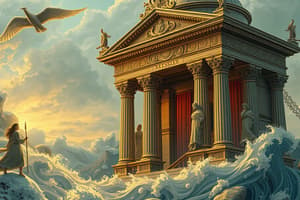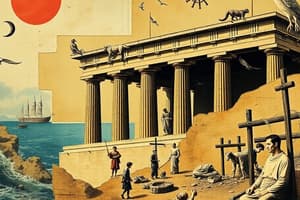Podcast
Questions and Answers
What defines the character of an epic hero?
What defines the character of an epic hero?
- They are always mortal beings without any divine intervention.
- They only undertake simple tasks without significant challenges.
- They possess superhuman strength, craftiness, and confidence. (correct)
- They are characterized by weakness and indecisiveness.
Which of the following is NOT a typical element of an epic plot?
Which of the following is NOT a typical element of an epic plot?
- Strange creatures
- Divine intervention
- Routine daily activities (correct)
- Treacherous weather
What role do archetypes play in epics?
What role do archetypes play in epics?
- They are completely unique and do not recur across stories.
- They eliminate the need for plot development.
- They serve as recognizable character and situation templates across cultures. (correct)
- They focus solely on minor characters without significant impact.
Which of the following themes is commonly found in epics?
Which of the following themes is commonly found in epics?
How does the setting of an epic typically differ from that of other narratives?
How does the setting of an epic typically differ from that of other narratives?
What is an epic simile?
What is an epic simile?
What is the function of epithets in epic poetry?
What is the function of epithets in epic poetry?
Which characteristic is NOT associated with the content of an epic?
Which characteristic is NOT associated with the content of an epic?
What is an epithet used for in poetry?
What is an epithet used for in poetry?
What event triggered the Trojan War?
What event triggered the Trojan War?
Which character is primarily highlighted as an epic hero in The Odyssey?
Which character is primarily highlighted as an epic hero in The Odyssey?
How did Odysseus ultimately enable the Greek forces to defeat Troy?
How did Odysseus ultimately enable the Greek forces to defeat Troy?
What role do gods play in the narratives of The Iliad and The Odyssey?
What role do gods play in the narratives of The Iliad and The Odyssey?
What literary device does an allusion represent?
What literary device does an allusion represent?
What challenges does Odysseus face during his journey home?
What challenges does Odysseus face during his journey home?
How did Homer compile the stories for The Iliad and The Odyssey?
How did Homer compile the stories for The Iliad and The Odyssey?
Flashcards are hidden until you start studying
Study Notes
The Epic
- The epic is a long narrative poem that recounts the adventures of an epic hero.
- It began in ancient Greece, with stories being passed down orally through bards.
- The epic is still very much alive in today's novels and movies.
- Homer's Odyssey is one of the most beloved epics in Western literature.
- It captivates us and carries us off into a time and place quite different from our own.
Elements of the Epic
- Epic Hero: Possesses superhuman strength, craftiness, and confidence.
- Epic Hero: Helped or harmed by gods or fate.
- Epic Hero: Embodies qualities valued by cultures.
- Epic Hero: Overcomes perilous situations.
Epic Plot
- Depicts a long, strange journey.
- Includes complications such as:
- Strange creatures
- Treacherous weather
- Divine intervention
- Large-scale events
Archetypes
- Characters and situations recognizable across times and cultures:
- Brave hero
- Evil temptress
- Sea monster
- Loyal servant
- Suitors’ contest
- Buried treasure
Epic Themes
- Courage
- The fate of a nation
- Loyalty
- Life and death
- Beauty
- A homecoming
Epic Setting
- Includes fantastic or exotic lands
- Involves more than one nation or culture
The Language of Homer
- Epic Simile: A comparison between two unlike things using the word like or as.
- Epithet: Renames a person or thing with a descriptive phrase.
- Allusion: A reference to a literary or historical person, place, event, or composition.
Examining the Homeric Epics
- The Iliad and The Odyssey are considered masterpieces of the epic form.
- Important plot elements:
- The interference of gods in human affairs
- The epic heroism of central characters
- The saga and aftermath of the Trojan War
- Homer drew on stories and legends passed down orally by bards.
The Trojan War
- The legendary conflict between Greece (or Achaea) and Troy began around 1200 BCE.
- Paris, a Trojan prince, kidnapped Helen, the wife of Menelaus, king of Sparta.
- Menelaus recruited allied kingdoms to attack Troy and recover his wife.
- The Greeks besieged Troy for ten years but could not breach the city walls.
- Odysseus, king of Ithaca, planned a way to break the stalemate by ordering his men to build a giant wooden horse.
- The people of Troy thought it was a peace offering and brought it inside the gates, but they were wrong.
- The horse was filled with Greek soldiers and the city was doomed.
Heroism
- The Odyssey recounts Odysseus’ adventures and struggles as he returns home from post-war Troy.
- He prevails against gruesome monsters, enchanting women, and greedy rivals who try to stop him.
- Odysseus uses cleverness and guile to overcome his trials.
Studying That Suits You
Use AI to generate personalized quizzes and flashcards to suit your learning preferences.




